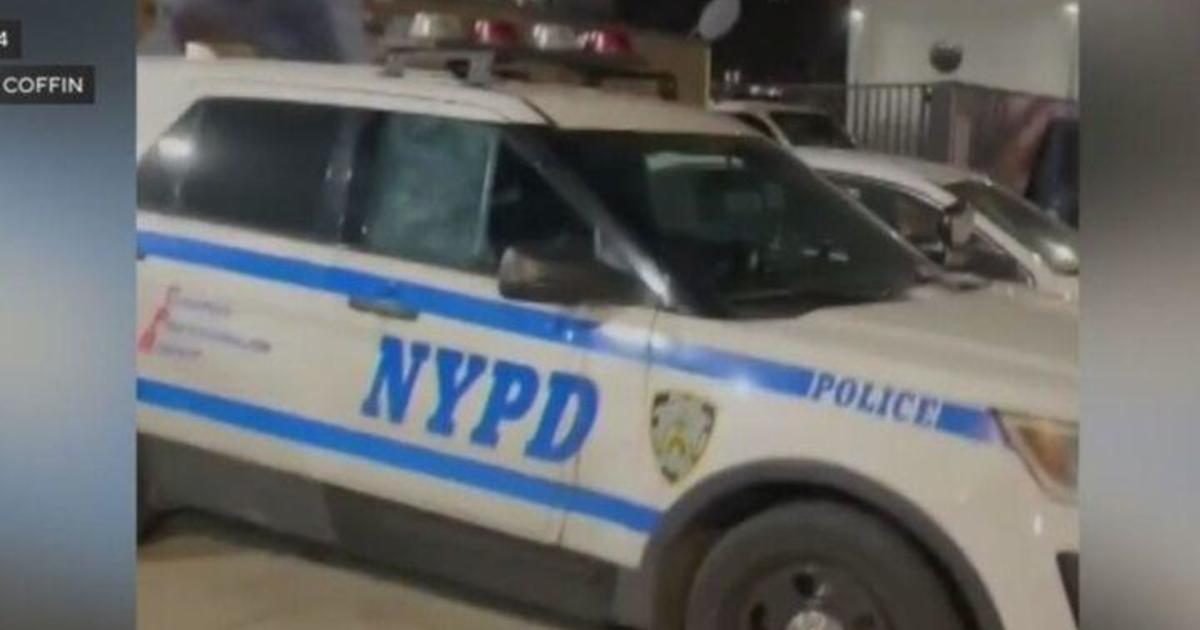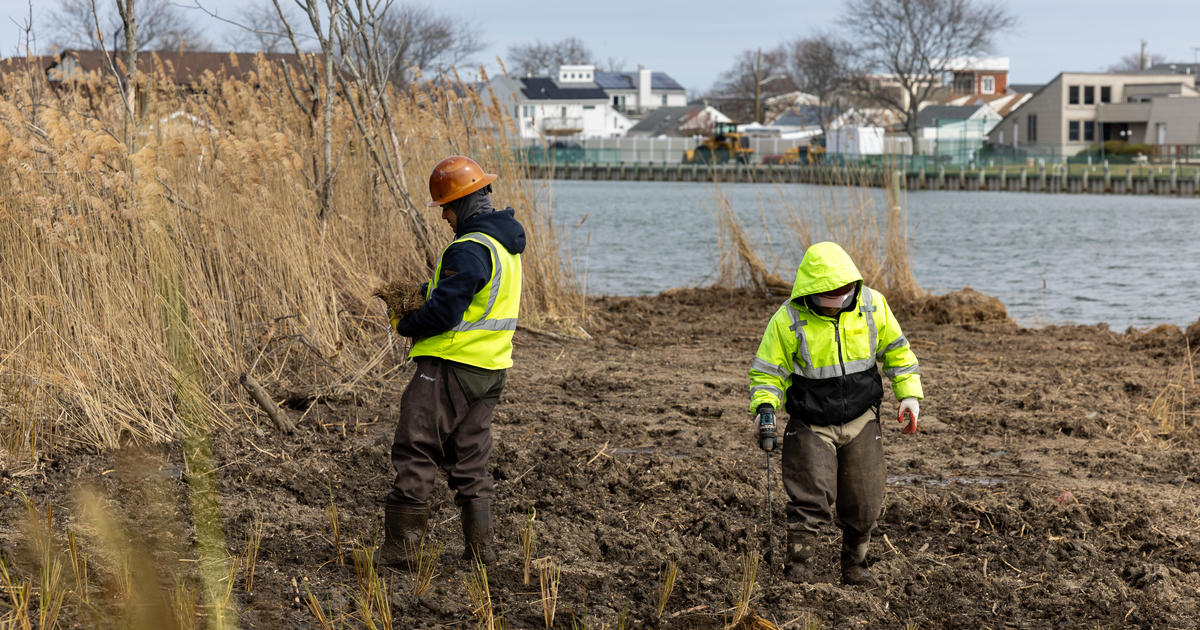Gov. Dannel Malloy: Connecticut Hospitals Ready To Treat Ebola
HARTFORD, Conn. (CBSNewYork) -- While the first case of Ebola in the United States was diagnosed just this week, officials in Connecticut say they have been closely monitoring the epidemic in West Africa for months and preparing for the possibility that it could make its way to the state.
Gov. Dannel Malloy said Thursday he has been briefed on the Ebola situation by state Health Commissioner Dr. Jewel Mullen.
While Malloy said the risk of an Ebola outbreak in the U.S. is "very low," he also said the state Department of Public Health has requested Connecticut hospitals to complete detailed checklists that, for example, asks them to ensure they can detect patients with the disease and protect health care workers so they can safely treat a patient.
Health Commissioner: NYC Ready To Treat Ebola
"CDC Director Dr. Tom Frieden reassured the public that by upholding strong health care infection control measures and public health practices, the U.S. can 'stop Ebola in its tracks,'" Malloy said in a news release. "Our state health department has been working and communicating with federal and state partners to ensure those strong measures and practices are in place here in Connecticut."
Added Mullen: "Any acute care hospital in the state, by following well-defined, standard infection control measures and with the use of proper personal protection equipment, is capable of caring for an Ebola patient. We would not need to designate particular hospitals to care a patient who is infected."
Meanwhile, New York City Health Commissioner Dr. Mary Bassett reiterated Thursday that hospitals in the city are, too, ready should Ebola reach there.
"For the last two months, we've been fielding inquiries from physicians, working with health care providers, hospitals and making sure we're prepared," she told 1010 WINS' Al Jones.
Bassett said there have already been 80 suspected cases of Ebola reported in New York City. Officials only had "genuine concern" about 10 of those. None tested positive for the potentially deadly illness.
On Tuesday, the U.S. Centers for Disease Control and Prevention announced that a man, who traveled from Liberia to Dallas to visit relatives, has become the first person diagnosed with Ebola in the United States.
Liberia officials said Thursday they will prosecute the man for lying on a health form before traveling.
Health officials in Texas said they have reached out to about 80 people who may have had direct or indirect contact with the man or someone close to him.
None of the people is showing symptoms, but health authorities have educated them about Ebola and told them to notify medical workers if they feel ill.
The group will be monitored to see if anyone seeks medical care during the three weeks immediately following the time of contact, said Erikka Neroes, of the Dallas County Health and Human Services agency.
The people include 12 to 18 who came in direct contact with the infected man, Thomas Eric Duncan, as well as others known to have had secondhand contact, she said.
"This is a big spider web" of people involved, Neroes said.
The initial group includes three members of the ambulance crew that took Duncan to the hospital, plus a handful of schoolchildren.
The Texas Department of State Health Services said Thursday it has a list of about 100 possible contacts but that the official number will be lower.
Health officials are focusing on containment to try to stem the possibility of the Ebola virus spreading beyond Duncan, who fell ill on Sept. 24. His sister, Mai Wureh, identified Duncan as the infected man in an interview with The Associated Press.
A Dallas emergency room sent Duncan home last week, even though he told a nurse that he had been in disease-ravaged West Africa. The decision by Texas Health Presbyterian Hospital to release Duncan could have put others at risk of exposure to Ebola before the man went back to the ER a couple of days later when his condition worsened.
The patient explained to a nurse last Thursday that he was visiting the U.S. from Africa, but that information was not widely shared, said Dr. Mark Lester, who works for the hospital's parent company.
Hospital epidemiologist Dr. Edward Goodman said the patient had a fever and abdominal pain during his first ER visit, not the riskier symptoms of vomiting and diarrhea. Duncan was diagnosed with a low-risk infection and sent home, Lester said.
The hospital is reviewing how the situation would have been handled if all staff had been aware of the man's circumstances.
But the diagnosis, and the hospital's slip-up, highlighted the wider threat of Ebola, even far from Africa.
"The scrutiny just needs to be higher now," said Dr. Rade Vukmir, a spokesman for the American College of Emergency Physicians.
Duncan has been kept in isolation at the hospital since Sunday. He was listed in serious but stable condition.
Neighbors in Monrovia, Liberia, believe Duncan become infected when he helped bundle a sick pregnant neighbor into a taxi a few weeks ago and set off with her to find treatment.
The 19-year-old woman was convulsing and complaining of stomach pain, and everyone thought her problems were related to her pregnancy, in its seventh month. No ambulance would come for her, and the group that put her in a taxi never did find a hospital. She died, and in the following weeks, all the neighbors who helped have gotten sick or died, neighbors said.
Duncan's neighborhood, a collection of tin-roofed homes, has been ravaged by Ebola. So many people have fallen ill that neighbors are too frightened to comfort a 9-year-old girl who lost her mother to the disease.
As CBS 2's Marlie Hall reported, four of Duncan's family members have been quarantined at their home and ordered not to take visitors. They will be monitored twice a day for fevers over the next three weeks.
Ebola is believed to have sickened more than 7,100 people in West Africa and killed more than 3,300, according to the World Health Organization. Liberia is one of the three countries hit hardest in the epidemic, along with Sierra Leone and Guinea.
Ebola symptoms can include fever, muscle pain, vomiting and bleeding, and can appear as long as 21 days after exposure to the virus. The disease is not contagious until symptoms begin. It spreads only by close contact with an infected person's bodily fluids.
Duncan left Liberia on Sept. 19, flying from Brussels to Dulles Airport near Washington. He then boarded a flight for Dallas-Fort Worth, according to airlines, and arrived the next day. He started feeling ill four or five days later, Frieden said.
Duncan reportedly helped a pregnant woman in Liberia who later died of Ebola. Liberian officials said that they intend to prosecute him for allegedly lying on a questionnaire.
Since the man had no symptoms on the plane, the CDC stressed there is no risk to his fellow passengers, said Dr. Tom Kenyon, director of the CDC's Center for Global Health.
Four American aid workers who became infected in West Africa have been flown back to the U.S. for treatment after they became sick. Three have recovered.
You May Also Be Interested In These Stories
(TM and © Copyright 2014 CBS Radio Inc. and its relevant subsidiaries. CBS RADIO and EYE Logo TM and Copyright 2014 CBS Broadcasting Inc. Used under license. All Rights Reserved. This material may not be published, broadcast, rewritten, or redistributed. The Associated Press contributed to this report.)



